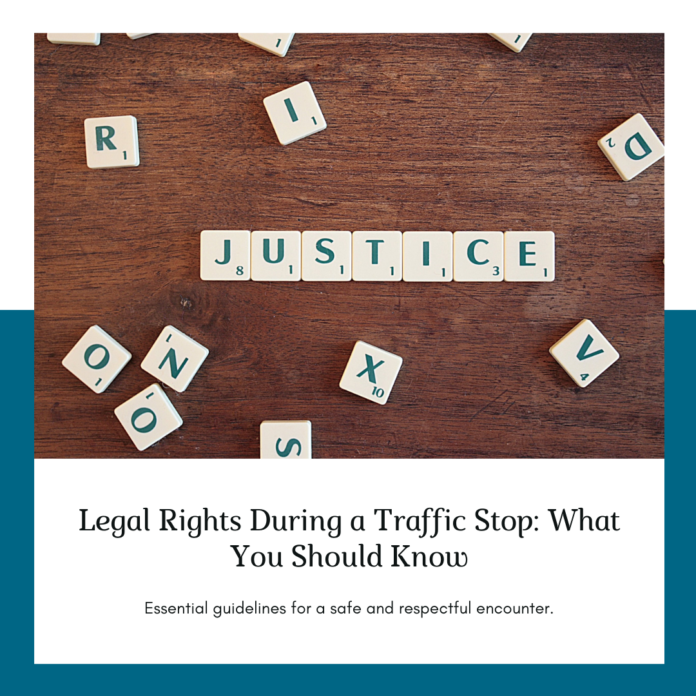Last Updated on April 26, 2024 by Silvy
Legal Rights During a Traffic Stop: What You Should Know
Imagine cruising down the highway, music pumping, windows down, when suddenly those flashing red and blue lights appear in your rearview mirror.
Your heart skips a beat. Getting pulled over can be a stressful experience, but knowing your legal rights can help you stay calm and collected during the interaction.
This comprehensive guide will equip you with the knowledge you need to navigate a traffic stop with confidence.
We’ll delve into your rights, answer frequently asked questions, and offer practical tips to ensure a respectful and lawful encounter with the police.
Why Knowing Your Rights Matters
Traffic stops are a common occurrence for drivers. While most interactions are routine, situations can escalate quickly.
Understanding your rights empowers you to participate calmly and respectfully, potentially avoiding unnecessary searches or citations.
Knowing When You’re Detained
Not all interactions with law enforcement constitute a detention. If an officer simply asks you a question and lets you go on your way, you weren’t detained.
However, if you’re not free to leave, such as when your license and registration are being checked, a detention has occurred. This is when your rights come into play.

Your Key Rights During a Traffic Stop
Let’s break down the essential rights you have during a traffic stop:
- The Right to Remain Silent: You have the right not to answer any questions beyond providing your name and address (if requested). This extends to not offering explanations or justifications for the stop.
- The Right to an Attorney: If you’re arrested, you have the right to request an attorney immediately. Don’t answer any questions until your lawyer is present.
- The Right to a Reasonable Search: Police officers generally need probable cause to search your vehicle. If you consent to a search, do so cautiously and understand you can withdraw consent at any time.
Be Polite and Respectful
While you have the right to remain silent, it’s always best to be polite and respectful towards the officer. Here’s how:
- Pull over safely and turn off your engine.
- Keep your hands visible and avoid making sudden movements.
- Provide your license, registration, and proof of insurance when requested.
- If you choose to exercise your right to remain silent, politely say so.
What You Can Do (and Can’t Do) During a Traffic Stop
Here are some additional things to keep in mind:
- You can ask if you’re free to leave.
- You don’t have to consent to a search of your vehicle unless the officer has probable cause.
- Don’t argue or become belligerent.
- If you feel the officer is overstepping their bounds, calmly ask to speak to a supervisor.

Beyond the Basics: Understanding Specific Scenarios
Traffic stops can vary depending on the circumstances. Here are some specific situations to consider:
- Being Pulled Over for a Minor Infraction: If you’re stopped for a minor traffic violation, like a broken taillight, the interaction is likely to be brief.
- Search Requests: If an officer asks to search your car, politely ask if they have probable cause. If they don’t, you can decline the request.
- Field Sobriety Tests: If you suspect you’ll be asked to perform a field sobriety test, you can politely decline. However, refusing a chemical test (breathalyzer or blood test) may have legal consequences depending on your location.
Important Disclaimer
This blog post is intended for informational purposes only and does not constitute legal advice.
Laws vary by jurisdiction, so if you have specific questions about your rights during a traffic stop, consult with an attorney in your area.
Frequently Asked Questions (FAQs)
What should I do if I get pulled over at night?
Turn on your interior dome light to improve visibility for both you and the officer. Otherwise, follow the same protocol as a daytime stop.
Can I film the traffic stop?
In most jurisdictions, you have the right to film a police interaction in public, including a traffic stop. However, local laws may vary, so it’s best to check beforehand.
What happens if I don’t have my registration or proof of insurance on me?
Explain the situation calmly to the officer. You may be able to provide proof electronically or have someone bring the documents to you.
Should I consent to a search if I have nothing to hide?
This is a personal decision. Remember, you have the right to refuse a search without probable cause.
What if I feel the officer is harassing me?
If you believe the officer’s actions are exceeding their authority, do not resist. Note the officer’s name and badge number, if possible. Once you’re free to leave, file a formal complaint with the police department’s internal affairs division.
Conclusion
Knowing your legal rights during a traffic stop empowers you to navigate the situation calmly and confidently.
By understanding your right to remain silent, request an attorney, and refuse unreasonable searches, you can protect yourself and ensure a respectful interaction with law enforcement.
Remember, politeness and respect go a long way, even during a stressful encounter.
Additional Resources
- American Civil Liberties Union – Know Your Rights https://www.aclu.org/know-your-rights/stopped-by-police
- National Highway Traffic Safety Administration (NHTSA) – Traffic Stops https://www.nhtsa.gov/
Disclaimer: While this blog post provides general information, it is not a substitute for legal advice.
For specific questions regarding your rights during a traffic stop, consult with an attorney in your area.


